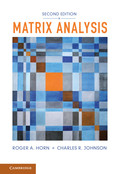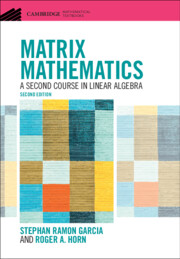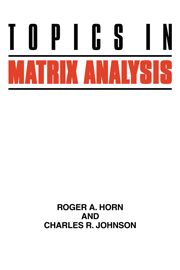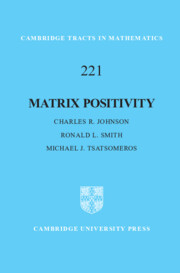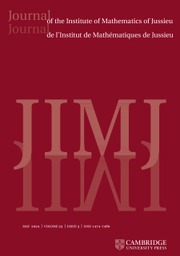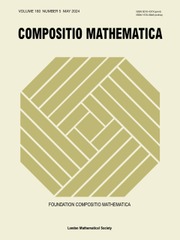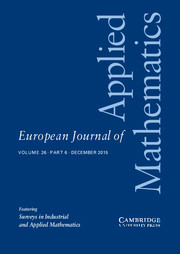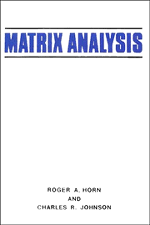Matrix Analysis
Linear algebra and matrix theory are fundamental tools in mathematical and physical science, as well as fertile fields for research. This second edition of this acclaimed text presents results of both classic and recent matrix analysis using canonical forms as a unifying theme and demonstrates their importance in a variety of applications. This thoroughly revised and updated second edition is a text for a second course on linear algebra and has more than 1,100 problems and exercises, new sections on the singular value and CS decompositions and the Weyr canonical form, expanded treatments of inverse problems and of block matrices, and much more.
- Comprehensive coverage of core advanced linear algebra topics, using canonical forms as a unifying theme
- More than 1,100 problems and exercises, many with detailed hints, including theme-based problems that develop throughout the text
- 2-by-2 examples illustrate concepts throughout the book
Reviews & endorsements
"The second edition of Matrix Analysis, as curated by Roger Horn and Charlie Johnson, is the definitive source and indispensable reference for the foundations of matrix analysis. The material is comprehensive yet thoughtfully collected, and presented with insightful exposition and crystal-clear organization. This book is for anyone who comes in contact with matrices, be it applied scientist, casual user, or experienced researcher."
Ilse Ipsen, North Carolina State University
"The second edition of Matrix Analysis by Horn and Johnson is a significant enhancement (featuring a large number of recent research results, new and illuminating approaches, a comprehensive summary of basic linear algebra and matrix theory, hints on some problems, and a highly detailed index) of the hugely successful and widely used first edition. It is a monumental contribution on the theory and applications of matrices. I had the honor of using some chapters of the draft of the second edition in my Advanced Matrix Analysis class at Georgia State University. I am certain that the second edition of Matrix Analysis will be the standard graduate textbook and an indispensable reference book on matrix theory for many years to come."
Zhongshan Li, Georgia State University
"The book is well organized, completely readable, and very enlightening. For researchers in matrix analysis, matrix computations, applied linear algebra, or computational science, this second edition is a valuable book."
Jesse L. Barlow, Computing Reviews
"The book is a valuable modern textbook devoted to the fundamentals of this active area of research, having many applications in mathematics and other disciplines. The book is clearly and carefully edited. The book is useful for graduate students, researchers and any person who loves matrix analysis."
Mohammad Sal Moslehian, Mathematical Reviews
"With the additional material and exceedingly clear exposition, this book will remain the go-to book for graduate students and researchers alike in the area of linear
algebra and matrix theory. I suspect there are few readers who will go through
this book and not learn many new things. It is an invaluable reference for anyone working in this area."
Anne Greenbaum, SIAM Review
"The new edition is clearly a must-have for anyone seriously interested in matrix analysis."
Nick Higham, Applied Mathematics, Software and Workflow blog
Product details
October 2012Hardback
9780521839402
662 pages
261 × 183 × 34 mm
1.3kg
1175 exercises
Available
Table of Contents
- 1. Eigenvalues, eigenvectors, and similarity
- 2. Unitary similarity and unitary equivalence
- 3. Canonical forms for similarity, and triangular factorizations
- 4. Hermitian matrices, symmetric matrices, and congruences
- 5. Norms for vectors and matrices
- 6. Location and perturbation of eigenvalues
- 7. Positive definite and semi-definite matrices
- 8. Positive and nonnegative matrices
- Appendix A. Complex numbers
- Appendix B. Convex sets and functions
- Appendix C. The fundamental theorem of algebra
- Appendix D. Continuous dependence of the zeroes of a polynomial on its coefficients
- Appendix E. Continuity, compactness, and Weierstrass' theorem
- Appendix F. Canonical pairs.

